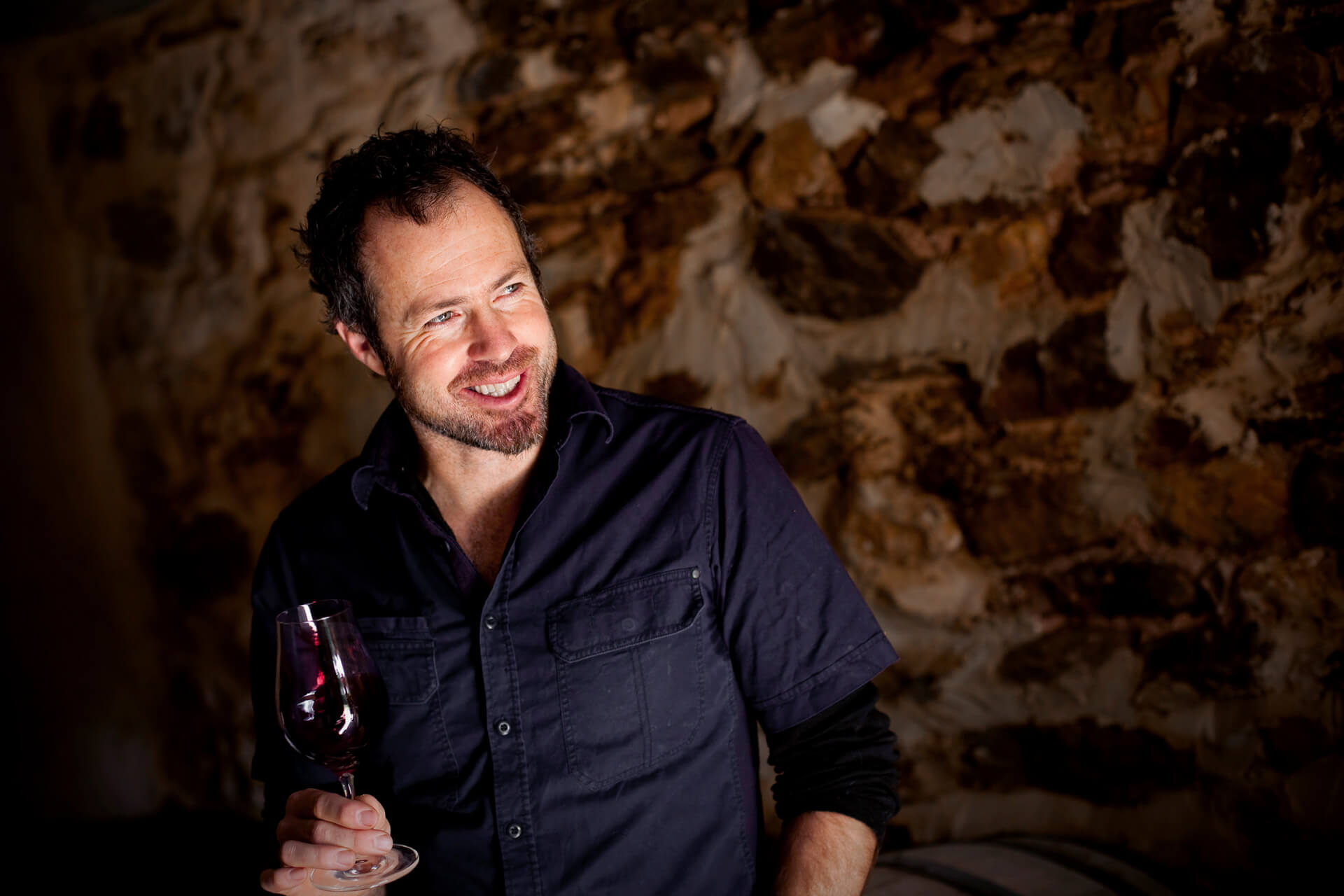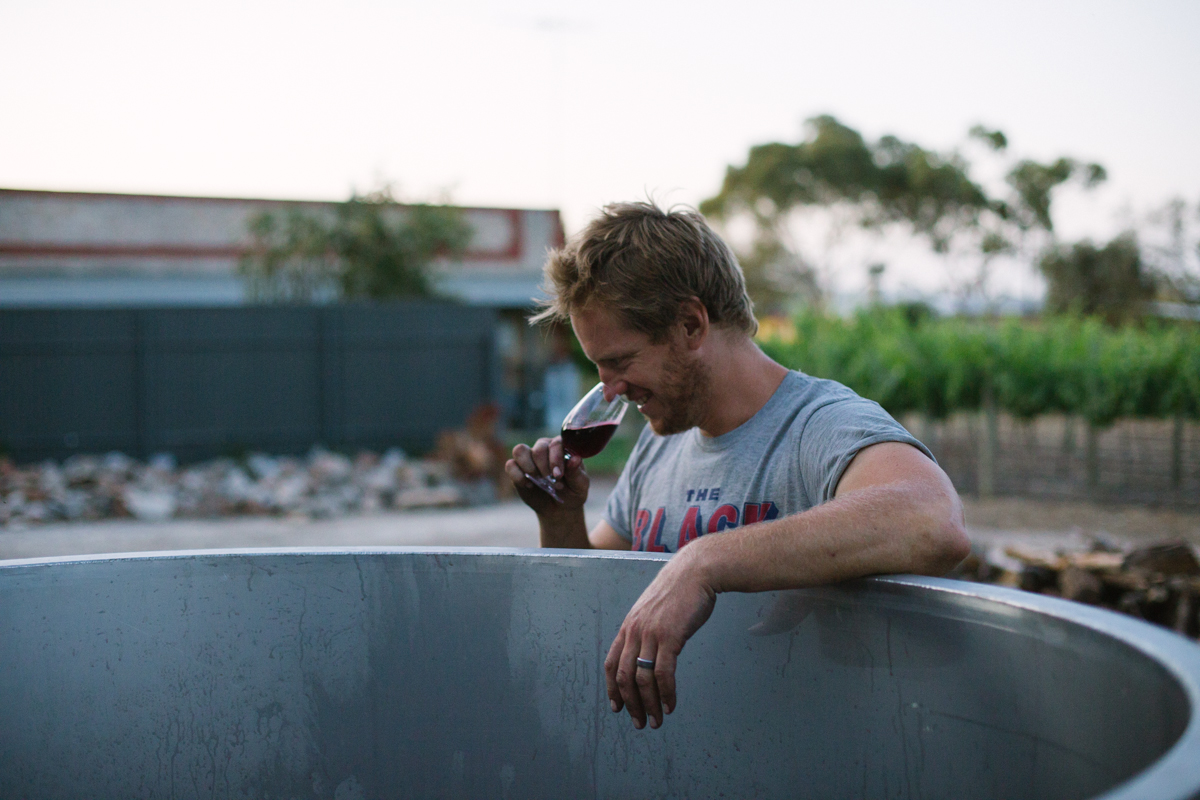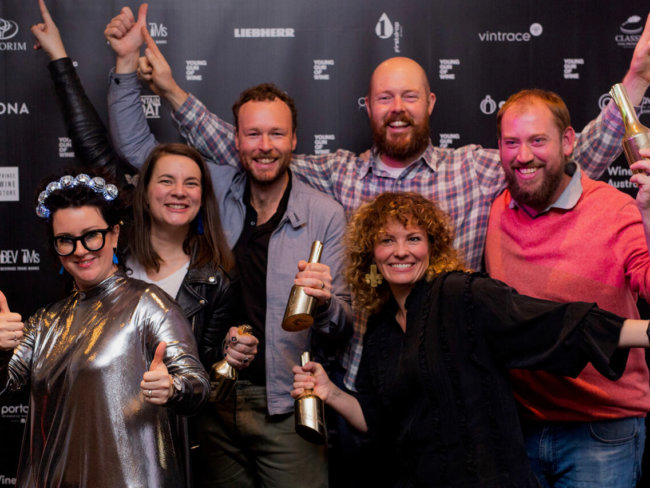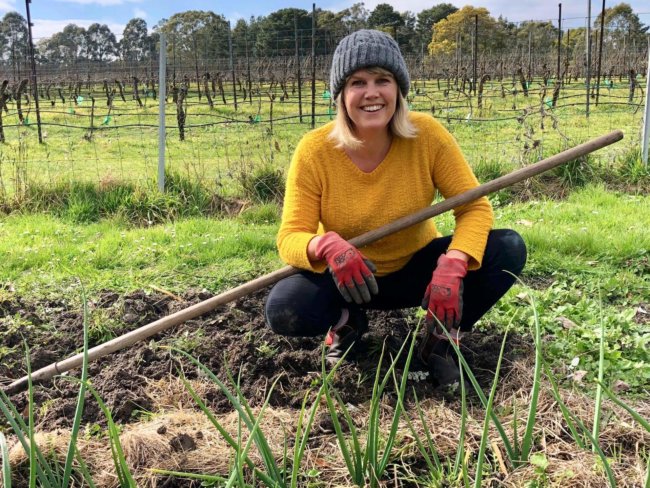Pete Schell of Spinifex was named the Young Gun of Wine in 2008. Since then, his winery has proven to be fertile ground for numerous new wine labels, and Schell seems to have some sort of Midas Touch, as the alumni reads like a who’s who of cutting edge winemakers and the awards: Abel Gibson of Ruggabellus (2012 Young Gun of Wine & People’s Choice awards), James Erskine of Jauma (2013 Winemaker’s Choice award) and David Geyer of Geyer (2018 awards finalist) have all come out of the Spinifex shed. But what is it about this place and this person that makes it such a catalyst for creative new labels?
Pete Schell made his first wines under the Spinifex label from a corner of his employer’s shed. He has been able to return the favour by offering new and emerging winemakers the same kind of break since.
If you have spent any time drinking Australian wines in the past two decades, the names Spinifex Wines and Pete Schell will be givens. Schell’s wines are sought after, collectible and expressive of the Barossa in a way that bucked old traditions while managing to channel them. The wines of Spinifex are recognised by an intensity delivered with finesse.
Ruggabellus, for instance, came into being during Gibson’s lunchbreaks. “I would tend to my ferment in the carpark at Spinifex and afterwards get on with my work for Pete,” he laughs.
The earliest releases were made at Turkey Flat. From the beginning, Schell wanted to make wines that conveyed an honest expression of vineyard. “The vintages I did in southern France gave me a lot of inspiration,” he says. “I realised the vineyard is the prime resource, it sets the potential of the wine. Good wine comes from good vineyards.”
He also wanted to dig deeper into the potential of the Barossa by working with fruit that was being overlooked. “Varieties I was working with in France existed but weren’t being utilised in the Barossa. The first two wines were blends using shiraz, mataro and grenache,” says Schell. “It was pretty off the wall to only make blended wines back then.”
The freedom to develop his own label while in the employ of an established winery is just one example, says Schell, of the fraternal attitude that pushed him along as a winemaker.
“My generation of guys got a huge amount of support from growers and the older winemaking fraternity. Support and pats on the back go a long way. It is part of a philosophy that if someone does well, it is good for everyone.”
A succession of winemakers has since gravitated to Spinifex to work for Pete and, with encouragement, launch their own labels from his shed. The names of alumni read like an astute wine list: Abel Gibson (Ruggabellus), James Erskine (Jauma) and David Geyer (Geyer Wines, Yetti and the Kokonut) amongst them.
Ruggabellus, for instance, came into being during Gibson’s lunchbreaks. “I would tend to my ferment in the carpark at Spinifex and afterwards get on with my work for Pete,” he laughs. All told, Gibson worked across four vintages at Spinifex from 2008 to 2011 covering wildly divergent years of prolonged heat, mildew and plenty.
“When it comes to the young guys working with us, there is a mutual gain,” says Schell. “They pick up a lot from us making wine; they come up with some pretty mad shit, but some things work, so we also get a lot from working with them.”
Straight away, Schell told Gibson to start making his own wines. “My approach was to wait until I had my own vineyard. But Pete said, ‘No, you’re passionate and you’re from the Barossa, so you should make wine. Get some grapes and the wine you make will help you buy a vineyard.’ He was right of course.”
The first year, Gibson bought a few tonnes of grapes from his father’s vineyard (Gibson Wines) and began experimenting. He wanted to express the old vines honestly, but in a lighter style, hoping to achieve “something pinot-like in the Barossa”. Ruggabellus wines made their debut in 2011. Gibson and wife Emma bought an old vine vineyard in Eden Valley in 2013, and have been gently recuperating it since.
![]()
Abel Gibson of Ruggabellus
There is a curious, almost causal relationship between time spent working with Schell (or indeed, being Schell) and creative power as a winemaker. Gibson stormed the Young Gun of Wine awards in 2012, winning the main trophy and People’s Choice – the only case in YGOW history of multiple wins by an individual winemaker in the one year. Former champion sommelier James Erskine was the Winemaker’s Choice winner in 2013. David Geyer was a YGOW finalist in 2018. Schell himself was crowned YGOW a decade earlier, when the award was in its second year.
The ‘Spinifex shed’ is an easy phrase to throw around, but it pays to look more closely at what it actually means. Aside from Schell, there are two others who have influence on the culture of the winery. There is Magali Gely, Schell’s wife and business partner, who is from a family of French vignerons and has worked in the Barossa for as long as her husband.
The other is Jason Schwarz (Schwarz Wine Company). The shed is leased by the two labels in partnership: Schell and Schwarz share winery equipment, and an attitude that helping new winemakers benefits the wine community as a whole. “The majority of the guys who have got a start with Spinifex, have equally been supported by Jason,” Schell points out.
“When it comes to the young guys working with us, there is a mutual gain,” says Schell. “They pick up a lot from us making wine; they come up with some pretty mad shit, but some things work, so we also get a lot from working with them.”
“Pete would taste the wines and say, ‘This is just kombucha. Clean it up guys.’ We tidied them up a bit. The wines evolved to be cleaner because of the influence of working in Pete’s space.”
What emerges is part winery, part modern-day salon for the exchange of ideas – although Schell himself is unlikely to express it that way. “Everyone who works with you ends up being your mate because winery work is a very close and informal situation,” he says. “It can be rough. We’re drinking green tea and beer. Half the time you’re hanging shit on each other and other times there are serious conversations.”
A unique identikit picture can be assembled of the winemaker from the anecdotes of former employees. Schell is a big-thinking, hard-working ‘unicorn’ of the Barossa, with a sensitivity for ferments, a love of new oak and wines with power, a connoisseur of green tea – if the collected impressions of Gibson, Erskine and Geyer are to be believed.
![]()
David Geyer of Geyer Wine
“Vineyard-wise, Pete is there most mornings for 1-2 hours,” says Geyer. “He’d come into the winery early in the morning, write stuff for us to do on the board, then he’d disappear into the vineyard observing where the fruit was up to.”
“Pete’s always been highly regarded in our circles as someone you can learn a lot from,” Geyer adds. “Of all the winemakers I’ve ever worked for, Pete is the most open-minded and observant in the vineyard. Lots of his stuff is naturally fermented with minimal additions, and I really gravitated towards that approach, which I hadn’t seen in the Barossa before.”
Geyer started with Spinifex in 2014, after returning from vintage in the South of France. He wanted to make his own wines using natural ferments, but initially wasn’t sure about how to approach them. “I started making both Geyer and Yetti wines (with Koen Janssens) at Spinifex, not really bottling anything, but definitely experimenting with natural ferments, and no additions except sulphur,” Geyer says. “They were very funky wines at the start.”
“Pete would taste the wines and say, ‘This is just kombucha. Clean it up guys.’ We tidied them up a bit. The wines evolved to be cleaner because of the influence of working in Pete’s space.”
Winemakers who work with Schell share with him fundamental ideas about the ethics of winemaking. They talk about trying to achieve an honest expression of the vineyard with their wines. They source grapes from organic vineyards, or tend their own vineyards in that way. They hope to make wines with freshness and life; they tend to be obsessed with natural ferments and the art of blending.
![]()
Pete Schell of Spinifex
But what the culture of the shed gives them is the confidence to make their own wines, in their own styles. They are listened to and encouraged by Schell.
“I’m not a believer that there’s a right way to do anything,” he says. “I act as a sounding board, hoping to give people confidence about what they want to do. All the advice I’ve given over time is helping them to back their own decisions.”
Erskine was a professional sommelier until he worked a vintage at Spinifex. What he wanted to do was make wine – “earlier picked wines without the addition of yeasts or acids” – and to change the way consumers related to wines. “So importantly, Pete told me: ‘Be organised. When you need a day off to pick or make your own wines, tell me ahead of time and do it. Don’t come back to me in a year’s time saying your wines aren’t up to scratch because you were busy working for me.’”
Schell somehow manages to create great wines, and other people who make great wines. From day one on the job, he encourages his winemakers to engage in a way that ultimately sets them off on their own course. It’s a rare example of altruism at work. While Schell might say he simply extends the same opportunities he’s been handed along the way, those who have been beneficiaries of the Spinifex culture recognise it as something standalone and unique.
“Pete is an outlier when it comes to the way he looks after us younger guys, and encourages people to make their own wine,” says Geyer.
Registrations for the 2021 Awards, the 15th annual edition, are now open – until December 18 (2020).
For the first time in our 15-year history, we will now be providing feedback to winemakers on their entries from the panel tasting. As well, we are creating a new trophy to recognise the best vigneron winemaker – that is, for a winemaker who is also managing the vines.
YGOW is open to young wine labels, as well as winemakers on the rise employed in established wineries.
Bringing together our audience of committed wine lovers, and complemented by our Wineslinger Awards for hospitality, Young Gun of Wine is the shortcut to all the cutting edge in wine.
We’re inviting all eligible winemakers to come get amongst it.








